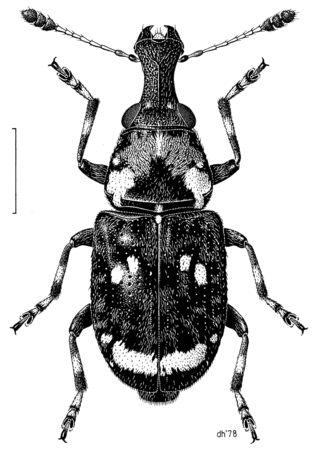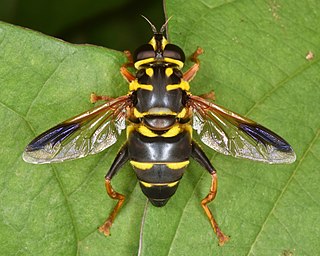
Plantaginaceae, the plantain family, is a large, diverse family of flowering plants in the order Lamiales that includes common flowers such as snapdragon and foxglove. It is unrelated to the banana-like fruit also called "plantain." In older classifications, Plantaginaceae was the only family of the order Plantaginales, but numerous phylogenetic studies, summarized by the Angiosperm Phylogeny Group, have demonstrated that this taxon should be included within Lamiales.

The Scathophagidae are a small family of Muscoidea which are often known as dung flies, although this name is not appropriate except for a few species of the genus Scathophaga which do indeed pass their larval stages in animal dung. The name probably derives from the yellow dung fly, which is one of the most abundant and ubiquitous flies in many parts of the Northern Hemisphere.

Anthribidae is a family of beetles also known as fungus weevils. The antennae are not elbowed, may occasionally be longer than the body and thread-like, and can be the longest of any members of Curculionoidea. As in the Nemonychidae, the labrum appears as a separate segment to the clypeus, and the maxillary palps are long and projecting.

Bombus barbutellus, or Barbut's cuckoo-bee, is a species of cuckoo bumblebee, widespread, if not especially common, in most of Europe.

Bombus sylvestris, known as the forest cuckoo bumblebee or four-coloured cuckoo bee, is a species of cuckoo bumblebee, found in most of Europe and Russia. Its main hosts are Bombus pratorum, Bombus jonellus, and Bombus monticola. As a cuckoo bumblebee, Bombus sylvestris lays its eggs in another bumblebee's nest. This type of bee leaves their young to the workers of another nest for rearing, allowing cuckoo bumblebees to invest minimal energy and resources in their young while still keeping the survival of their young intact.
The World Register of Marine Species (WoRMS) is a taxonomic database that aims to provide an authoritative and comprehensive catalogue and list of names of marine organisms.

Salpingidae or narrow-waisted bark beetles is a family of beetles in the superfamily Tenebrionoidea. The species are small, about 1.5 – 7 mm in length. The family is globally distributed and consists of about 45 genera and 300 species, which are generally found in the temperate regions of both hemispheres. The family is mainly associated with plants as well as with ascomycete and hyphomycete fungi. Some members of the family are associated with unusual habitats, like Aegialites and Antarcticodomus, which are found in coastal areas including the intertidal zone, with former feeding on algae.

Hypogastruridae is a family of springtails. Members of the family are common and widespread with a cosmopolitan distribution of about 660 species in about 40 genera.

Meromacrus is a genus of 43 neotropical and nearctic flower flies or hoverflies

Thelephora palmata commonly known as the fetid false coral or stinking earthfan, is a species of clavarioid fungus in the family Thelephoraceae. The fruit bodies are leathery and coral-like, with branches that are narrow at the base before widening out like a fan and splitting into numerous flattened prongs. The wedge-like tips are whitish when young, but darken as the fungus matures. The common names of the fungus refers to its pungent odor, likened to fetid garlic. A widely distributed but uncommon species, it is found in Asia, Australia, Europe, North America, and South America, where it fruits on the ground in both coniferous and mixed forest.

Scirtidae is a family of beetles (Coleoptera). These beetles are commonly referred to as marsh beetles, as the larvae are typically associated with stagnant water, but can be found in flowing water. Adults prefer decomposing plant material near the water's edge. More than an estimated 600 species are known worldwide, distributed among at least 60 genera.

iNaturalist is an American 501(c)(3) nonprofit social network of naturalists, citizen scientists, and biologists built on the concept of mapping and sharing observations of biodiversity across the globe. iNaturalist may be accessed via its website or from its mobile applications. iNaturalist includes an automated species identification tool, and users further assist each other in identifying organisms from photographs and even sound recordings. As of 9 July 2024, iNaturalist users had contributed approximately 197,660,888 observations of plants, animals, fungi, and other organisms worldwide, and 290,007 users were active in the previous 30 days.
Apicystis is a genus of parasitic alveolates of the phylum Apicomplexa.
Plants of the World Online (POWO) is an online database published by the Royal Botanic Gardens, Kew. It was launched in March 2017 with the ultimate aim being "to enable users to access information on all the world's known seed-bearing plants by 2020". This was Kew's answer to the "2020 target 1" of the Convention on Biological Diversity (CBD): "an online flora for all known plants."
Ceratophysella gibbosa is a species of springtails in the family Hypogastruridae.
Ceratophysella denticulata, the mushroom springtail, is a species of springtails in the family Hypogastruridae.

Ceratophysella succinea is a species of springtails in the family Hypogastruridae.
Paralecia is a monotypic fungal genus in the family Cladoniaceae. It contains a single species, the lichenicolous fungus Paralecia pratorum, found in Europe.











